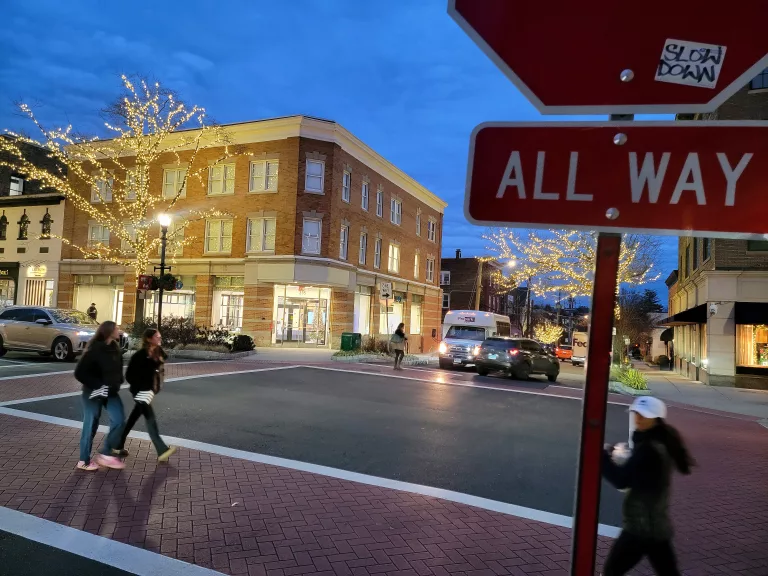
A recent vote by the Board of Estimate and Taxation (BET) to accept the Safe Streets for All grant was the second time the grant has come before the BET. The first time it did not survive the fiscal 2025 budget process.
The $400,000 grant, which funds all but $100,000 of a study that aims to collect comprehensive data on improving pedestrian and traffic safety, passed with a narrow margin of seven to five. The vote saw six Democrats and Republican Chairman Harry Fisher in favor, while five Republicans opposed.
Support for the Grant
Harry Fisher, the Republican Chairman of the BET, played a pivotal role in the passage of the grant. Fisher advocated for a more thorough review of the Safe Streets initiative, emphasizing the need for more community input. “I thought that this Safe Streets item didn’t get an adequate airing before the main fiscal ‘25 budget process, and that’s why I brought it back and made sure that the BET Budget Committee and the full BET had an option to really question DPW,” Fisher explained.

He underscored the importance of addressing the town’s safety issues proactively, stating, “Safe Streets for All is just a study. It identifies where we’ve got issues, it documents those so we can plan going forward for improvements. If those improvements end up getting funded by state or federal sources, then we have to pay attention to complete street design. But it’s not mandated.”
Fisher also consulted extensively with various town officials to assess the potential risks and benefits of the grant. “I spoke to the risk manager for the town and the town attorney, and I sent them the material and said, ‘What is the risk of doing this? And what is the risk of not doing it?’ Both of them said that the risk of not doing it exceeds the risk of doing it. That if we know there are issues in the town and we fail to study them and come up with a comprehensive plan, we’re just playing ostrich,” he noted.
Leslie Moriarty, the Democratic Caucus Leader, expressed confusion over the reluctance to support the grant. “Speaking for the Democratic members on the BET, we believe this grant directly addresses a key priority for our residents – traffic, pedestrian and bicycle safety. The first step to address the issue should be gathering data and creating a database of information to determine priorities and solutions. This grant offsets what would have been town funds to complete the planning process. We do not understand the reluctance of the 5 Republican members who did not support planning and community input for an important quality of life initiative.”
First Selectman Fred Camillo echoed Fisher’s sentiments, highlighting the town’s efforts in securing the grant. “The five Republican BET members voted against a public safety grant that the town has worked hard for; four-fifths of it’s coming back to us. We’ve asked them, and the Department of Public Works had asked them to reconsider,” Camillo explained. He noted the importance of the grant in enhancing pedestrian and public safety, which are priorities for his administration.
Opposition on BET
However, the five Republican members – David Alfano, Nisha Arora, Karen Fassuliotis, Lucia Jansen, and Leslie Tarkington – raised significant concerns. In a joint statement (see page 7), they criticized the process and potential long-term costs. “Safe Streets for All is a worthy goal, but what problem are we attempting to solve?” they questioned. They argued that the town’s infrastructure initiatives are already robust, pointing out the millions spent annually to maintain safe and ADA-compliant sidewalks and roads.
They also expressed skepticism about the grant’s necessity, stating, “Grants are great and should be pursued and used to subsidize town projects. But the method by which our Department of Public Works (DPW) has used the federal and state grant programs is backwards. DPW’s method is simple – find the grant first, then look for projects second.”
A primary concern among the opposing members is the potential loss of local control over projects and financial implications. They emphasized the need for a clear vision and planning before accepting any grants, fearing that the town might be locked into unnecessary or low-priority projects. “We have heard from many Old Greenwich residents that they neither requested nor appreciate a new 10’ wide bicycle path through the center of Old Greenwich on Sound Beach Avenue,” they stated, highlighting past projects that were initiated primarily due to available grants rather than community needs.
First Selectman’s Response
Camillo expressed frustration with the opposition, noting that these members have consistently questioned various grants. “These five members have questioned almost every single grant, even the ones they accepted. They were even threatening not to take the Glenville grant, which was fully funded,” he remarked, illustrating the internal conflicts and the BET is experiencing right now in garnering unified support for grant-related projects.
Addressing concerns about maintaining local control if the grant money was accepted, Camillo was unequivocal. “We’ve accepted grant money for years and years and never lost local control.” He clarified that the acceptance of grants has never compromised the town’s autonomy in decision-making.
“To the unfounded claim that the town is looking for grants before actually having projects,” he continued, “the town applies for grants to support priorities that are well-documented in the Plan of Conservation and Development, statistical analyses, and most important, things the people of Greenwich have identified. Traffic is an issue I hear about everywhere I go – people in this town are desperate for information and solutions to traffic problems. How can anyone say that we found a grant for a traffic study and after that we suddenly decided we needed one? That makes no sense.”
Camillo commended Harry Fisher for his leadership and willingness to lead on several projects, including the Glenville Project and the Old Greenwich School. “Harry really stepped up and showed real leadership on several things when it came to the Glenville Project and Old Greenwich School,” he noted, highlighting Fisher’s role in advancing key initiatives despite opposition.
Future Implications
The passage of the Safe Streets for All grant marks a significant step in addressing traffic and pedestrian safety concerns in Greenwich. While the grant’s opponents remain wary of its implications, proponents believe it will provide the necessary framework for future improvements and potential state or federal funding.
The grant must now go before the full Representative Town Meeting (RTM) for final approval. This additional step ensures that all town representatives have a say in the acceptance and implementation of the grant, adding another layer of scrutiny and debate. The RTM’s decision will be crucial in determining whether the grant moves forward and how the planning and safety measures will be implemented across Greenwich.





